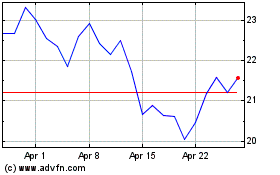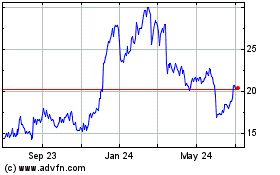Trump Victory Throws Doubt on AT&T-Time Warner Deal, Net Neutrality--Update
November 09 2016 - 5:11PM
Dow Jones News
By Ryan Knutson
Donald Trump's victory in the presidential campaign throws doubt
on AT&T Inc.'s proposed acquisition of Time Warner Inc. and
could undermine the government's net neutrality rules. But many of
his positions on the technology and telecommunications sectors are
largely unknown.
Mr. Trump said in October that he would block the AT&T-Time
Warner deal, and that he would try to break up the Comcast
Corp.-NBC Universal merger. In both cases, Mr. Trump said the media
is controlled by too few people.
Shares of AT&T rose 1.2% Wednesday, while Time Warner
shares, which were already trading at a wide discount to AT&T's
offer, fell 1.5%.
At an investor conference Wednesday, AT&T finance chief John
Stephens extended an olive branch. "We really look forward to
working with President-elect Trump," Mr. Stephens said. "His
policies and his discussions about infrastructure investment,
economic development, and American innovation all fit right in with
AT&T's goals."
Analysts say other industry consolidation is more likely.
Investors sent Sprint Corp. and T-Mobile US Inc. shares higher,
believing a merger between the two wireless carriers was more
likely under a Trump administration. Sprint shares rose 13%, while
T-Mobile gained 5%.
T-Mobile CEO John Legere said the election is positive in "many
ways" for T-Mobile and called for America to unite and move forward
together. "Let's see what an out of the box, nontypical,
nonpolitician can do for America," Mr. Legere said.
Richard Greenfield, an analyst at BTIG, said it is hard to
predict what Mr. Trump's stance against the AT&T-Time Warner
deal means for other sector consolidation. "Honestly, until we
understand the extent of Trump's views on the dangers of media
industry consolidation, it is impossible to know what deals could
get done," he wrote in a research note.
Independent telecom analyst Roger Entner predicted the Federal
Communications Commission would take a less activist role under Mr.
Trump. Beyond that, it isn't clear because neither candidate said
much about telecom during the campaign, he said. "It was basically
not a topic at all, which means to me that they haven't really
thought about it yet," Mr. Entner said during a conference call
held by the industry trade group CTIA.
In the past, Mr. Trump made statements against net neutrality,
saying it would "target conservative media" and comparing it
against the Fairness Doctrine, which required broadcasters on
government airwaves to provide balanced coverage of controversial
issues. Net neutrality requires all web traffic be treated equally,
and it doesn't allow certain content to get special treatment.
Analysts at New Street Research believe Mr. Trump will likely
align with traditional Republican thinking on telecom policy.
Particularly on complex, low-publicity items, "partisan gravity
will be sufficient to bring Trump's view into line with his party's
well-established path," researchers wrote in a note to clients
earlier this year.
It would be difficult, but not impossible, for Mr. Trump to
unwind the FCC's 2015 net neutrality rules. Those rules were upheld
by a Washington, D.C., appeals court, but the telecom industry has
appealed to the Supreme Court. If the court agrees to hear the
case, and Mr. Trump is able to appoint conservative judges, it is
plausible the rules could be overturned. The FCC could also simply
reclassify the internet again, and turn it back to the more lightly
regulated model used before, said Blair Levin, a former FCC
official who now serves as an adviser to New Street Research.
More than a year ago, after Mr. Trump began his presidential
campaign, the New Street Research analysts published a
tongue-in-cheek research note about the impact his presidency would
have on the U.S. telecom market. The note joked about how AT&T
and Verizon Communications Inc. would succeed under a Trump
presidency because "They are big. They are huge. They are
tremendous."
New Street Research sent out a revised note a few months later
after Mr. Trump began winning states in the Republican primary. We
"thought the prospect of a Trump presidency quite low," they
wrote.
Analysts at Citigroup say Mr. Trump's victory could affect some
media stocks as his embrace of social media boosts Twitter Inc. and
Facebook Inc., while his confrontational relationship with
traditional outlets hurts CBS, Disney, Time Warner and Fox.
Likewise, Mr. Trump's stance on net neutrality could help cable
companies like Comcast Corp. and Charter Communications Inc. but
hurt over-the-top players like Netflix Inc., Citigroup said.
Mr. Levin said a rewrite of the 1996 Telecom Act is more likely
given that Republicans now control both Congress and the White
House. A new bill would likely rein in the FCC's power, he said.
"The unpredictability of what happens now is so extreme," he said.
"When it comes to policy, we are coloring outside the lines."
Thomas Gryta contributed to this article.
Write to Ryan Knutson at ryan.knutson@wsj.com
(END) Dow Jones Newswires
November 09, 2016 16:56 ET (21:56 GMT)
Copyright (c) 2016 Dow Jones & Company, Inc.
SentinelOne (NYSE:S)
Historical Stock Chart
From Mar 2024 to Apr 2024

SentinelOne (NYSE:S)
Historical Stock Chart
From Apr 2023 to Apr 2024
